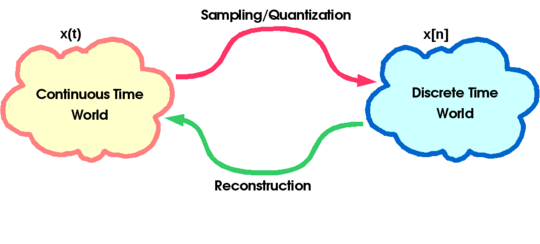| (One intermediate revision by the same user not shown) | |||
| Line 11: | Line 11: | ||
'''A:''' A signal that can be represented by a sequence of 0's and 1's. | '''A:''' A signal that can be represented by a sequence of 0's and 1's. | ||
*The signal must be discrete time (D.T.): | *The signal must be discrete time (D.T.): | ||
| − | **x[n], n | + | **x[n], n ∈ Z |
*The signal values must come from a discrete and finite signal. | *The signal values must come from a discrete and finite signal. | ||
| − | **e.g. x[n] | + | **e.g. x[n] ∈ {0,1} |
| − | **e.g. x[n] | + | **e.g. x[n] ∈ {0,1,2,3,...,255} (grayscale values) |
== The Digital System == | == The Digital System == | ||
| − | + | [[Image:Digitalsystem.png|frameless|upright=3]] | |
Three main types: | Three main types: | ||
| Line 40: | Line 40: | ||
== The Continuous Time World and The Discrete Time World == | == The Continuous Time World and The Discrete Time World == | ||
| + | [[Image:Worlds.png|frameless|upright=3]] | ||
| − | The Continuous Time (C.T.) World | + | '''The Continuous Time (C.T.) World''' |
*Most natural signals live here | *Most natural signals live here | ||
*Things are intuitive | *Things are intuitive | ||
*Easy math | *Easy math | ||
| − | The Discrete Time (D.T.) World | + | '''The Discrete Time (D.T.) World''' |
*Digital media lives here, along with computers, MATLAB, and digital circuits. | *Digital media lives here, along with computers, MATLAB, and digital circuits. | ||
[[ ECE438 (BoutinFall2009)|Back to ECE438 (BoutinFall2009)]] | [[ ECE438 (BoutinFall2009)|Back to ECE438 (BoutinFall2009)]] | ||
Latest revision as of 10:07, 23 September 2009
Contents
[hide]ECE 438
Q: What is ECE 438 about?
A: Digital signals and systems.
Q: What is a digital signal?
A: A signal that can be represented by a sequence of 0's and 1's.
- The signal must be discrete time (D.T.):
- x[n], n ∈ Z
- The signal values must come from a discrete and finite signal.
- e.g. x[n] ∈ {0,1}
- e.g. x[n] ∈ {0,1,2,3,...,255} (grayscale values)
The Digital System
Three main types:
- Software (MATLAB, C program)
- Firmware
- Hardware
Advantages of Digital Signals & Systems
Digital Systems are:
- Precise
- Reproducible
- Easy to build
- Adaptable
- Easy to upgrade/fix
- Can be saved on a bistable storage device
The Continuous Time World and The Discrete Time World
The Continuous Time (C.T.) World
- Most natural signals live here
- Things are intuitive
- Easy math
The Discrete Time (D.T.) World
- Digital media lives here, along with computers, MATLAB, and digital circuits.



